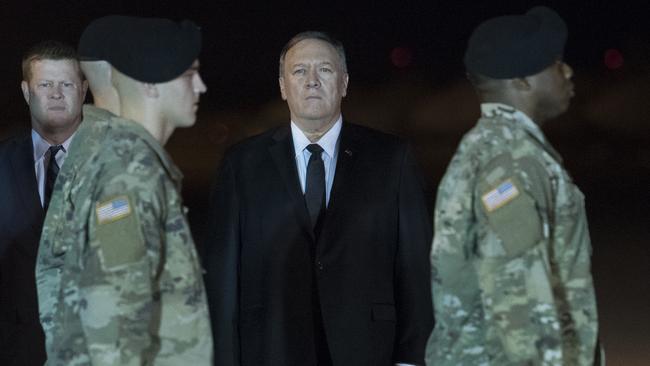Mike Pompeo clings to hope of Afghan peace deal
US Secretary of State Mike Pompeo has defended Donald Trump’s abrupt move to call off peace negotiations with the Taliban.

US Secretary of State Mike Pompeo has defended Donald Trump’s abrupt move to call off peace negotiations with the Taliban but has still left the door open for a large withdrawal of US troops.
“I’m not pessimistic,” Mr Pompeo said about a possible peace deal with the extremist group which had been close to fruition after many months of difficult negotiations.
“I’ve watched the Taliban do things and say things they’ve not been permitted to do before.
“I hope it’s the case the Taliban will change their behaviour.”
Mr Pompeo’s comments following the President’s surprise announcement he had called off peace negotiations after the Taliban took responsibility for an attack in Kabul “that killed one of our great soldiers, and 11 other people”. “What kind of people would kill so many in order to seemingly strengthen their bargaining position?” he tweeted. “They didn’t, they only made it worse!”
Mr Pompeo said the peace talks had ended “for the time being” because the Taliban had “overreached”.
The sudden setback came after Mr Trump revealed that Afghan President Ashraf Ghani and Taliban leaders had been due to hold a secret meeting at Camp David in the US to nut out a peace deal to end the almost 18-year war.
Mr Trump’s decision to end the peace talks is a serious setback for hopes of a deal and has triggered speculation in Washington as to what prompted the move. The President said he called off the Camp David summit because of the Taliban’s admission that it was behind the attack last week.
However, US negotiators have been discussing the peace deal with the Taliban for many months during which time there have been repeated and deadly attacks in Afghanistan.
Taliban-orchestrated attacks in that country have killed nine US servicemen since late June and numerous Afghans.
Some have speculated that Mr Trump had second thoughts after criticism from conservatives, including congressional Republicans, that he was offering any sort of deal to the Taliban. Others said he was wary of striking a peace deal with the Taliban only days before this week’s anniversary of the 9/11 terror attacks that led to the US invasion of Afghanistan.
There are no easy or perfect options for Mr Trump in striking a deal with the Taliban that would allow him to fulfil his promise of withdrawing some of the 14,000 US troops deployed there.
This latest setback came after the US and the Taliban reached an “in principle” deal under which about 5000 US troops leave the country 135 days after the agreement was signed.
The remaining 9000 US troop, as well as about 8600 mostly NATO troops, would then be reduced in phases depending on the Taliban’s behaviour.
For its part, the Taliban would promise to not allow terror groups including al-Qa’ida and Islamic State to operate bases in Afghanistan and it would promise to enter talks with the existing Afghan government headed by Mr Ghani.
But the Ghani government has expressed deep concern about the peace deal, which was largely negotiated without it.
The Afghan government fears that after an agreement is struck, the Taliban may offer a starkly different view of the type of government it wants, making a power-sharing arrangement all but impossible.
By that stage, it says, the US troop withdrawal will be well under way, leaving it exposed to the Taliban’s wishes with little negotiating leverage.
Despite Mr Trump’s decision to end negotiations with the Taliban for now, the President has said he wants to reduce the number of troops in Afghanistan, a conflict he has criticised as never-ending.
But the White House is also wary of repeating Barack Obama’s mistake when he reduced US troop numbers in Iraq so sharply that it created the conditions for a violent insurgency.
Despite the setback, Mr Pompeo suggests that the US will ultimately need to strike a deal with the Taliban at some point to end the war. “If you’re going to negotiate peace, you often have to deal with some pretty bad actors,” he said. “I know the history, too, at Camp David, and indeed President Trump reflected on that. Some pretty bad actors have travelled through that place throughout recorded history.”
These comments suggest that this setback is not the end of a negotiated peace to the Afghan war, but merely a roadblock.
Cameron Stewart is also US contributor for Sky News Australia



